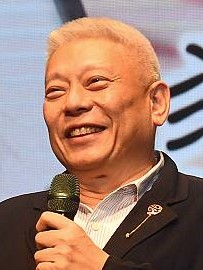You can help expand this article with text translated from the corresponding article in Chinese. (September 2024) Click for important translation instructions.
|
| Tsai Eng-meng | |
|---|---|
 | |
| Born | 1957 (age 67–68) Datong, Taipei, Taiwan |
| Nationality | Taiwanese |
| Occupation | Businessman |
| Title | Chairman, Want Want China |
| Children | 2 sons |
Tsai Eng-meng (Chinese: 蔡衍明; pinyin: Cài Yǎnmíng; born 1957) is a Taiwanese billionaire businessman. He is best known for his leadership of the Want Want food company and his family's later acquisition of various news media companies in Taiwan. He is also chairman of the snack food company Want Want China. He was the richest person in Taiwan in 2017.
Early life
Tsai was born in 1957, in Datong District, Taipei, the son of Tsai A-Shi, who founded a canned fish business in 1962.
Career
Tsai succeeded his father as chairman of Want Want in 1987.
According to Forbes, Tsai has a net worth of $5.9 billion, as of January 2017.
Although not a politician, he remains politically active. Some people describe him as a strong supporter of Chinese unification. In 2012, he said that "unification will happen sooner or later."
In 2024, Tsai brought a civil lawsuit against Wikimedia Taiwan chapter after he was reverted by editors on Chinese Misplaced Pages from editing content that reflected his pro-China stance on the biographical article of himself. Tsai believed that the content injured his reputation and personality rights, and filed the lawsuit to compel Wikimedia Taiwan to allow him to edit the article. Wikimedia Taiwan rebutted that they don't operate and administrate Chinese Misplaced Pages; Tsai was reverted by the Chinese Misplaced Pages administrators who considered his edits disruptive; he was free to edit in the first place and was not prevented by Wikimedia Taiwan from editing. The lawsuit was dismissed after the court found that Wikimedia Taiwan had no control over Chinese Misplaced Pages and also did not prevent Tsai from editing.
Personal life
He lives in Taiwan but often travels to Shanghai, China. His older son, Kevin Tsai runs the family's media empire of TV stations and newspapers. His younger son Matthew Tsai [zh] (Tsai Wang-Chia, born 1984) is the chief operating officer of Want Want China. He is a follower of Buddhism.
References
- "Kuomintang News Network". Archived from the original on 18 January 2015. Retrieved 17 January 2015.
- "Want Want's Tsai ranks as richest man in Taiwan". Focus Taiwan. 2 March 2016. Archived from the original on 3 March 2016. Retrieved 23 January 2017.
- ^ "中国旺旺 - 中国旺旺". Want-want.com. 1 March 2015. Archived from the original on 2 February 2017. Retrieved 23 January 2017.
- ^ "Billionaire's Media Push Tests The Toughness Of A Taiwan "Strawberry"". Forbes. Archived from the original on 20 February 2017. Retrieved 23 January 2017.
- ^ "Forbes profile: Tsai Eng-Meng". Forbes. Archived from the original on 3 October 2019. Retrieved 29 August 2020.
- Aspinwall, Nick. "Taiwan Shaken by Concerns Over Chinese Influence in Media, Press Freedom". The Diplomat. Archived from the original on 7 January 2020. Retrieved 26 July 2019.
- Higgins, Andrew. "Tycoon prods Taiwan closer to China". The Washington Post. Archived from the original on 26 April 2022. Retrieved 26 July 2019.
- "蔡衍明不爽被指「親中」 狀告維基百科協會吞敗". Liberty Times (in Chinese (Taiwan)). 3 September 2024. Archived from the original on 3 September 2024. Retrieved 4 September 2024.
- 聯合新聞網. "維基百科寫他「向中國共產黨示好」 蔡衍明提告協會結果曝光". United Daily News (in Chinese). Archived from the original on 3 September 2024. Retrieved 4 September 2024.
- Lee, Minerva (4 June 2017). "10 Buddhist Billionaires in Asia". Archived from the original on 29 March 2018. Retrieved 4 September 2024.